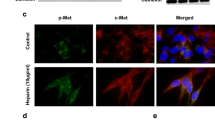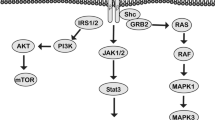Abstract
Hepatoma-derived growth factor (HDGF), a heparin-binding growth factor, has a wide range of biological functions, including mitogenic activity and vascular development. Recent studies demonstrated that HDGF also acted as an oncogene with aberrantly increased activity in multiple human cancers; however, little is known about the biological function of HDGF in gallbladder cancer (GBC). In this study, we focused on the clinical significance and biological functions of HDGF in GBC and found that Nuclear HDGF protein overexpression was frequently detected in GBC tissues. Patients with nuclear HDGF-positive tumors had worse overall survival than patients with HDGF-negative tumors. Furthermore, treatment of GBC lines with HDGF-targeting siRNA oligonucleotides (HDGF-siRNA) significantly reduced the proliferation of GBC-SD and SGC-996 cell lines and diminished both anchorage-independent growth on soft agar and cell migration. These data indicate that HDGF acts as a putative oncogene in GBC and could be a novel diagnostic and therapeutic target for GBC.



Similar content being viewed by others
References
Wistuba II, Gazdar AF. Gallbladder cancer: lessons from a rare tumour. Nat Rev Cancer. 2004;4(9):695–706.
Boutros C, Gary M, Baldwin K, Somasundar P. Gallbladder cancer: past, present and an uncertain future. Surg Oncol. 2012;21(4):e183–91.
Wang JW, Peng SY, Li JT, Wang Y, Zhang ZP, Cheng Y, et al. Identification of metastasis-associated proteins involved in gallbladder carcinoma metastasis by proteomic analysis and functional exploration of chloride intracellular channel 1. Cancer Lett. 2009;281(1):71–81.
Huang JS, Chao CC, Su TL, Yeh SH, Chen DS, Chen CT, et al. Diverse cellular transformation capability of overexpressed genes in human hepatocellular carcinoma. Biochem Biophys Res Commun. 2004;315(4):950–8.
Bremer S, Klein K, Sedlmaier A, Abouzied M, Gieselmann V, Franken S. Hepatoma- derived growth factor and nucleolin exist in the same ribonucleoprotein complex. BMC Biochem. 2013;14:2. doi:10.1186/1471-2091-14-2.
Lin YW, Li CF, Chen HY, Yen CY, Lin LC, Huang CC, et al. The expression and prognostic significance of hepatoma-derived growth factor in oral cancer. Oral Oncol. 2012;48(7):629–35.
Mao J, Xu Z, Fang Y, Wang H, Xu J, Ye J, et al. Hepatoma-derived growth factor involved in the carcinogenesis of gastric epithelial cells through promotion of cell proliferation by Erk1/2 activation. Cancer Sci. 2008;99(11):2120–7.
Liao F, Dong W, Fan L. Apoptosis of human colorectal carcinoma cells is induced by blocking hepatoma-derived growth factor. Med Oncol. 2010;27(4):1219–26.
Meng J, Xie W, Cao L, Hu C, Zhe Z. shRNA targeting HDGF suppressed cell growth and invasion of squamous cell lung cancer. Acta Biochim Biophys Sin. 2010;42(1):52–7.
Yamamoto S, Tomita Y, Hoshida Y, Morii E, Yasuda T, Doki Y, et al. Expression level of hepatoma-derived growth factor correlates with tumor recurrence of esophageal carcinoma. Ann Surg Oncol. 2007;14(7):2141–9.
Chen X, Yun J, Fei F, Yi J, Tian R, Li S, et al. Prognostic value of nuclear hepatoma-derived growth factor (HDGF) localization in patients with breast cancer. Pathol Res Pract. 2012;208(8):437–43.
Uyama H, Tomita Y, Nakamura H, Nakamori S, Zhang B, Hoshida Y, et al. Hepatoma-derived growth factor is a novel prognostic factor for patients with pancreatic cancer. Clin Cancer Res. 2006;12(20 Pt 1):6043–8.
Pinheiro C, Longatto-Filho A, Scapulatempo C, Ferreira L, Martins S, Pellerin L, et al. Increased expression of monocarboxylate transporters 1, 2, and 4 in colorectal carcinomas. Virchows Arch. 2008;452(2):139–46.
Li ML, Wang XF, Tan ZJ, Dong P, Gu J, Lu JH, et al. Ethyl pyruvate administration suppresses growth and invasion of gallbladder cancer cells via downregulation of HMGB1-rage axis. Int J Immunopathol Pharmacol. 2012;25(4):955–65.
Ren H, Chu Z, Mao L. Antibodies targeting hepatoma-derived growth factor as a novel strategy in treating lung cancer. Mol Cancer Ther. 2009;8(5):1106–12.
Kung ML, Tsai HE, Hu TH, Kuo HM, Liu LF, Chen SC, et al. Hepatoma-derived growth factor stimulates podosome rosettes formation in NIH/3T3 cells through the activation of phosphatidylinositol 3-kinase/Akt pathway. Biochem Biophys Res Commun. 2012;425(2):169–76.
Hsu SS, Chen CH, Liu GS, Tai MH, Wang JS, Wu JC, et al. Tumorigenesis and prognostic role of hepatoma-derived growth factor in human gliomas. J Neurooncol. 2012;107(1):101–9.
Sasaki Y, Negishi H, Idogawa M, Yokota I, Koyama R, Kusano M, et al. p53 negatively regulates the hepatoma growth factor HDGF. Cancer Res. 2011;71(22):7038–47.
Chen SC, Kung ML, Hu TH, Chen HY, Wu JC, Kuo HM, et al. Hepatoma-derived growth factor regulates breast cancer cell invasion by modulating epithelial—mesenchymaltransition. J Pathol. 2012;228(2):158–69.
Zhou Y, Zhou N, Fang W, Huo J. Overexpressed HDGF as an independent prognostic factor is involved in poor prognosis in Chinese patients with liver cancer. Diagn Pathol. 2010;5:58. doi:10.1186/1746-1596-5-58.
Acknowledgments
This work was supported by the Shanghai Committee of Science and Technology (No. 12JC1406700, 12410705900, 12401905800), the Foundation of Xinhua Hospital (No.12YJ01), the National Natural Science Foundation of China (No. 81172029, 81272402), the Foundation of Shanghai Outstanding Academic Leaders (No.11XD1403800), the National High Technology Research and Development Program (863 Program; No.2012AA022606), and the Medical and Engineering Cross-Foundation of Shanghai Jiaotong University (No. YG2011ZD07).
Conflict of interest
No conflict of interest to disclose.
Author information
Authors and Affiliations
Corresponding author
Additional information
Maolan Li, Jun Shen contributed equally to this work.
Rights and permissions
About this article
Cite this article
Li, M., Shen, J., Wu, X. et al. Downregulated expression of hepatoma-derived growth factor (HDGF) reduces gallbladder cancer cell proliferation and invasion. Med Oncol 30, 587 (2013). https://doi.org/10.1007/s12032-013-0587-7
Received:
Accepted:
Published:
DOI: https://doi.org/10.1007/s12032-013-0587-7




